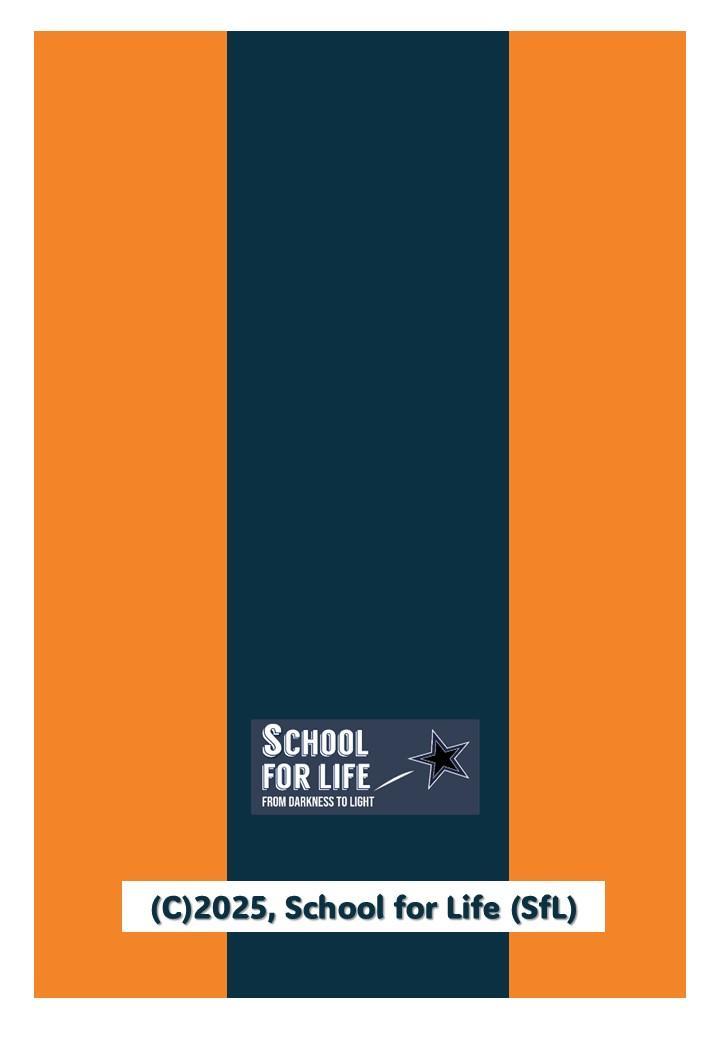

ACKNOWLEDGING OUR DONORS

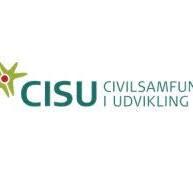
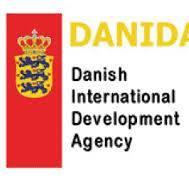


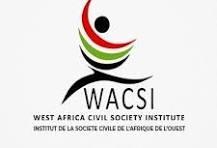
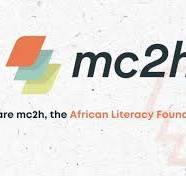
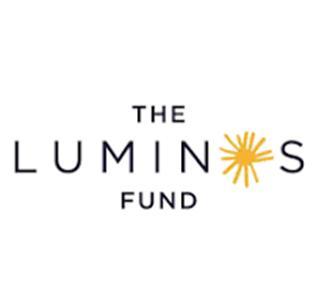


Foreword
The month of June was filled with exciting activities and impactful stories. From community engagements, stakeholder consultation and capacity building initiatives, SfL continue to make strides in promoting inclusive and quality education for all, especially the most marginalized.
In the Northern, Oti and Ashanti regions, our efforts in the month of June, focused on the over 7,000 Out of School Children, who are currently enrolled in the Complementary Basic Education classes across 12 districts and over 280 communities. Series of activities were conducted to enhance the effective running of the classes including monitoring of learner and facilitator attendance, home visits on absentee learners, community sensitization, mentoring and coaching of classroom facilitators and parental engagement sessions.
In line with our strategic objective of facilitating community led approaches for inclusive and uninterrupted schooling, in June, we intensified efforts to enable spaces and platforms and enhanced communities’ capacity to engage and demand accountability from their local authorities. The Parental Learning Circle Initiative continues to show very promising prospects for redefining parental role in the literacy journeys of children. These safe and friendly self-help platforms are offering parents the opportunity to reflect and reimagine their roles in the learning activities of their children.
In the Northeast, Savanna, Northern, Upper East and upper west regions, SfL continues to collaborate with relevant education stakeholders to promote inclusive quality education. Across Yunyoo Nasuan, Cheriponi,East Mamprusi, Nanumba North, Wa West, Tatale Sanguli, Northeast Gonja and Talensi districts, we held information campaigns, leadership training on inclusive education and vision mapping exercises and the mobilization of excluded groups such as the Fulbes and PWDs.
In this newsletter you will read the inspiring stories of our work and impact on individuals and communities.
ACTIVITIES
Over 5,000 cohort-3 CBE learners prepare for endline assessment
AcrossourCBEclassesintheNorthern and Oti regions, learners are getting readytositfortheendlineassessment forthecohort3oftheCBEprogramme under the Ghana EducationOutcomes Project (GEOP).

The assessment which will be conducted by an independent body, the National Council for Curriculum and Assessment (NaCCA), forms an integral part of the CBE programme. July will be nine months since the cohort 3 CBE classes commenced.
The CBE programme is designed to provide foundational literacy, numeracy and life skills to out of school children through an accelerated learning module for a periodofninemonths,withtheaimed
of transitioning them into mainstream schools.
Facilitators are wrapping up the classes awaiting the independent assessment to be conducted by NaCCA.
We wish all learners the best as this stage forms a milestone in their lives.
It is our vision to see these learners continue their education to the highestlevelandinthefuturebecome responsible people in the community. Theyremainourhopes for for abetter future.

Photo credits: SfL Communications Team
ALP class in session at Bongnayili
ALP class in session at Diggu
Information Campaign enhances citizen-duty bearer interaction
Within the month of June, citizens networks across the 6 project districts held interactions with local assemblies and the education directorates through the information campaign sessions. Duringthese sessions, citizens from project communities highlighted critical education gaps in their communities. The Information Campaign was conducted to enable spaces for citizens to engage with education authorities and increase their voices in public education discourse in their communities.
"I am very happy School for Life has created this platform for us to meet directly with the duty bearers. When we come to the Assembly or GES, they say Director is not on the seat. So, we don't get to tell them about our problems in our communities, but today I can see they are all seated and we can all get the chance to tell them what is worrying us".
Mr. Andrews Atuah, School Management Committee (SMC) chairman for Tongo-Beo community in the Talensi District of the Upper East Region, expressing his excitement during the Information Campaign session with education sector duty bearers in the district.

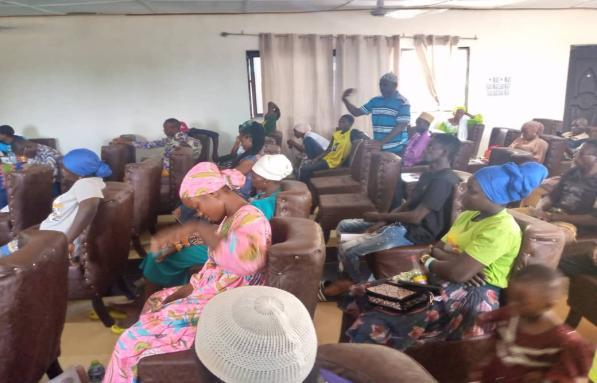
The event was organised in six districts across 5 regions in Northern Ghana bringing together various stakeholders to share information regarding the delivery of basic education in their respective districts. Various representatives of Municipal and District Assemblies and Education Directorates interacted with various groups such as women groups, PTA/SMC leadership, traditional leaders, among others.
The event forms part of SfL advocacy efforts of empowering citizens to enable them to demand accountability from various duty bearers through the Citizens-led Actions for Educational Accountability and Responsiveness in Ghana (CLEAR) Project.
The CLEAR project is funded by the Global Partnerships for Education through the Education Outloud programme.
Photo credits: CLEAR Field Team
Information campaign session
Information campaign session
SfL engages the Parliamentary Select Committee on Education
During the month, School for Life held a productive meeting with the Parliamentary Select Committee on Education of the Parliament of Ghana. The meeting served as a critical reflection platform, aligning with our mandate of advocating for equity in access and financing basic education in Ghana.
The meeting discussed key evidence/ findings from two reports.
1. A study on Ghana’s Basic Education
Funding landscape: Trends, Gaps and impacts in underserved regions of Ghana.
2. CSOs report on the state of public basic education.
Key issues captured in the reports and discussed during the meeting included basic education financing, teacher deployment and postings, furniture situation, classroom situation, capitation grant disbursement etc.
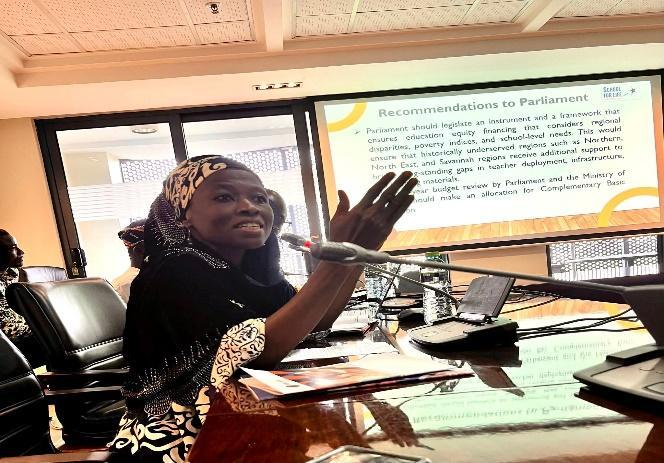
The meeting also discussed the out-ofschool-situation in Ghana and decried the
lack of provision for the complementary education programme in the 2025 national budget.
Among other key recommendations, School for Life called on the committee to pay particular attention to the funding provision for basic education especially infrastructure, furniture and the CBE program.
The committee emphasized the importance of the discussions and highlighted the need for continued collaboration with CSOs like School for Life. The Chairman of the committee, Mr. Peter Nortsu-Kotoe indicated that ‘it is refreshing to hear the findings from your work, this is commendable, and we as a committee will take up the issues highlighted in here. We have access to the ministry and the Minister of Education, and we will certainly engage him with the findings to find measures to address them’.

Photo credits: SfL Communications team
Director Wedad speaking
A cross-section of SfL staff and committee
SfL Partners with GES to conduct Vision Mapping Sessions in Yunyoo and Chereponi districts

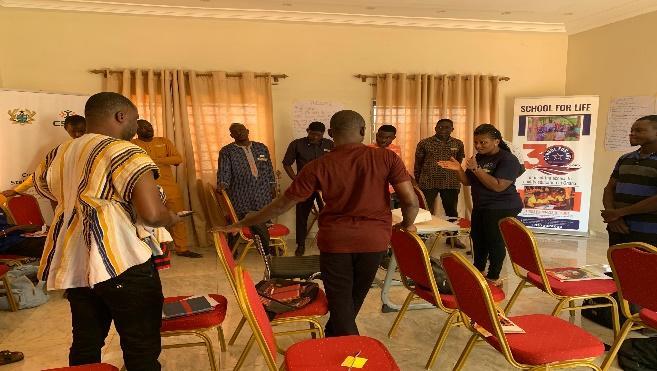
Vision mapping is an approach to development that, places communities at the forefront to lead, plan and execute developmental actions according to their own aspirations for their communities. In collaboration with the District Directorate of the Ghana Education Service of the Chereponi and Yunyoo-Nasuan districts, we commenced the Strengthening Inclusive Education Project, which aims to work with communities and the District Education Directorates to advance inclusive education and work to address key gaps that affect the delivery of education in the districts.
A training was held for GES staff to enhance their capacities t to to lead the vision mapping sessions at the community level. Subsequently, vision mapping sessions were heldacross 6 AreaCouncilsbringingtogether 18 communities (3 per area council). The sessions afforded the community members to reflect on their current situation and wheretheywanttobeinthefuture,andwho will be the drivers of change in these visions they have for their communities.
The community vision maps will serve as a blueprint to drive community change toward the model communities they envision. During the training in Chereponi, Mr. Yombu Kojo Emmanuel, the School Improvement Support Officer (SISO) for Tombu Circuit, stated that;
“the training was very effective and helped us to learn especially where it spoke about one of the principles of the vision mapping that when the vision is definite and purposeful It compels us to put in all effort, so it will go a long way for us to enable the community also put in much efforts. Also, when they are making their visions they should not state it as if they are looking for external support but look among them or within their society what they can do to help solve the problem.”
A community member at Nabaal in the Yunyoo-Nasuan district said, ‘today’s session was a very good platform for me. I have been able to contribute to developing my community vision especially looking at addressing the education challenges. Everyone has a role to play, and I am committed to playing my part to make my community a better one’.
Photo credits: SfL Communications team
Vision mapping session, Yunyoo-Nasuan District
Vision mapping training session, Chereponi District
Engagement with District/Municipal/ Education Oversight Committees

Across the 6 the districts where the Citizens Led Action for Educational Accountability (CLEAR) project is implemented, we worked with the local assemblies to organize quarterly District Education Oversight Committee (D/MEOC) meetings. The Ghana Education Service Act provides for the establishment of the District Education Oversight Committee (DEOC) with a mandate to oversee and ensure quality education at the district level. It interacts with stakeholders in education.
The District Education Oversight Committee (DEOC) is the highest decision-making body on educational matters in the district and thus the governing body. It is supposed to hold quarterly meetings to review and apprise itself with education development in the districts.
The CLEAR Project supported the project districts to hold the meetings that provided members with the opportunity to discuss and take critical decisions affecting education in the districts. Our field teams played key roles in organizing the meetings and providing key evidence of our work in the districts. The presentation highlighted key achievements and success stories, showcasing how the CLEAR Project has positively impacted educational governance and community participation. The District Education Directorates and the assemblies presented the status and progress of education in their districts, highlighting furniture deficits, classroom deficits, teacher situation, teacher accommodation, students’ enrolment and performance and strengthening School Management Committees (SMCs) and Parents Teachers Association (PTAs).

Major issues that required urgent attention are furniture and classrooms. The D/MEOCs indicated they will embark on school visits to have firsthand details about the impact of the issues. The District Chief Executive for Talensi, Mr. John Millim Nabwomya, said
MEOC meeting in Nanumba North municipality
DEOC Meeting in Talensi district
‘We are happy to have met as a DEOC to find ways to address education gaps in our district. As a new DCE I pledge to take the decisions made here forward to help address the key challenges to give our learners the best learning environment so that performance can be enhanced’.
The districts/municipalities are East Mamprusi Municipality, Nanumba North Municipality, Northeast Gonja District, Tatale/Sanguli district, Talensi district and the Wa West district.
Photo credits: CLEAR Field Officers
CLEAR project embarks on community engagement to mobilise marginalized groups
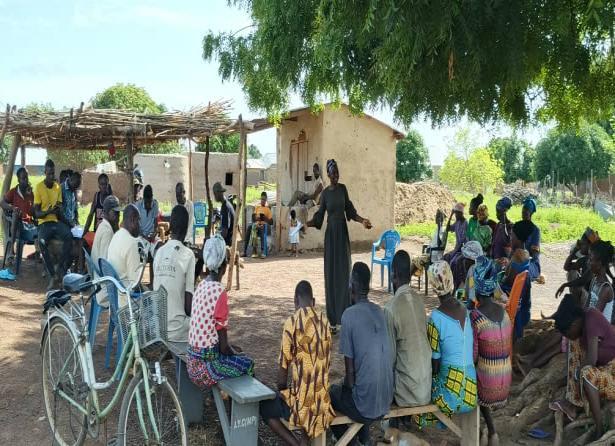
Infurtheranceof SfL’squesttopromoteinclusive education and advocate for equitable access to quality education in rural Ghana and with additional funding support from the Education Out loud on the Gender Equality and Social
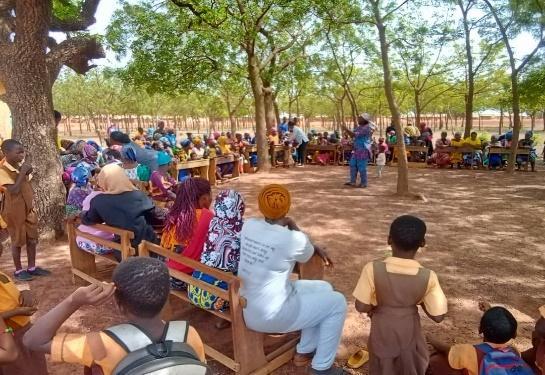
Inclusion stream, we have commenced engagement with 60 project communities to ensure that Fulbes and Persons Living with Disabilities (PWDs) have access to education. Through this process Fulbes and PWDs are being moblised to form part of a critical group of citizen network working to promote inclusive education, and ensuring the rights of these marginalized groups are protected and safeguarded. Their capacities are being built to effectively engage local education authorities to ensure their inclusion in the provision of education.
The process also involves the identification and selection of Gender Equality and Social Inclusion (GESI) champions who will be key drivers of GESI issues in the communities.
“True development begins when every voice is heard and every person, women, persons with disabilities, and marginalized groups like the Fulbes is seen, valued, and included in shaping their future, that’s a true development of a society or community” stated Mr Emmanuel (Sheaga Primary Head Teacher).
Engagement session in Yeleyiri in the WaWest district
Engagement session in East Mamprusi
Mr Abdulai Iddi (A Fulbe from Dabogshie community in the Northeast Gonja District) had this to say during the engagement in the community
"Before, I thought sending my children to herd cattle was enough. But now I see that if they go to school, they can help us understand the world better and even protect our traditions in new ways. Education is not leaving our culture behind; it is adding light to it."
Photo credits: CLEAR Field Officers
GEOP Phase-out: exit plans and engagements
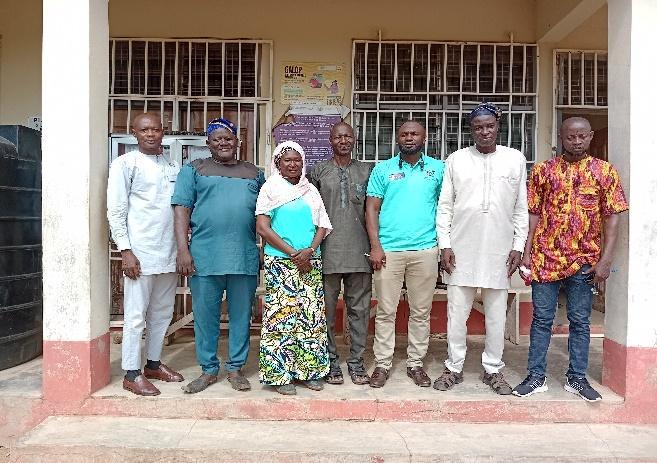
GEOP team in a photo with GES officers
In September this year, the last cohort of the Accelerated Learning Program (ALP) under the Ghana Education Outcomes Project (GEOP) will be graduating, marking the end of the ALP component of the project. As such, SfL is embarking on strategic engagements with the relevant government stakeholders as part of our sustainability plan and exit strategies. In line with this, this month, SfL and the district education authorities undertook a joint monitoring exercise in selected communities in Nanton, Kumbungu, Savelugu and Tolon districts in the Northern Region. The joint monitoring was conducted in collaboration with the Ghana Education Service and the Complementary Education Agency.
The visit offered SfL the opportunity to brief the District Education Directorate on the progress of the project including key milestones, challenges and plans for the exit of the current phase of the project. They also assessed the progress and wellbeing of learners who have been transitioned from ALP classes into the formal school system. The SfL team encouraged local stakeholders, including teachers, school heads, and community leaders to remain committed to supporting learners’ retention and performance.
Across all the schools visited, the staff commended SfL for its role in promoting quality education delivery and access. Theynoted how the CBE has impacted learners, citingcases of CBE graduates excelling in the formal school. They also encouraged, SfL to extend its activities to the mainstream schools. At Tibung R/C and Jegbo Ahmadiyya, both in the Kumbungu District, they noted the challenge of absenteeism and its effects on learner performance.
At Nwodua, the headmaster and focal teacher confirmed a general improvement in learner attendance, though a few learners were noted to be irregular. The focal teacher and staff indicated they actively conduct home visits to engage parents, which has contributed significantly to improved attendance and retention.
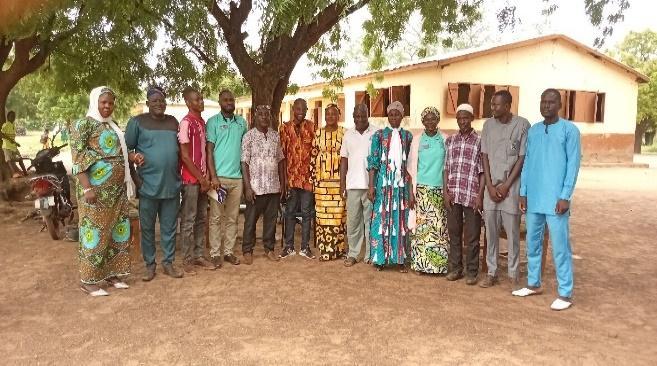
Over one-thousand out-of-school children get second chance to continue their education
As part of ongoing efforts by School for Life (SfL) and its partner, the Luminos Fund, to provide out-of-school children (OOSCs) a second chance to education. SfL has so far mobilised 1,022 OOSCs across 33 communities in the Atebubu-Amantin Municipality of the Bono East Region.
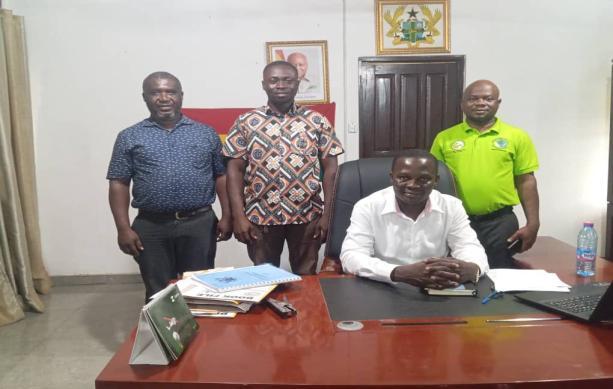
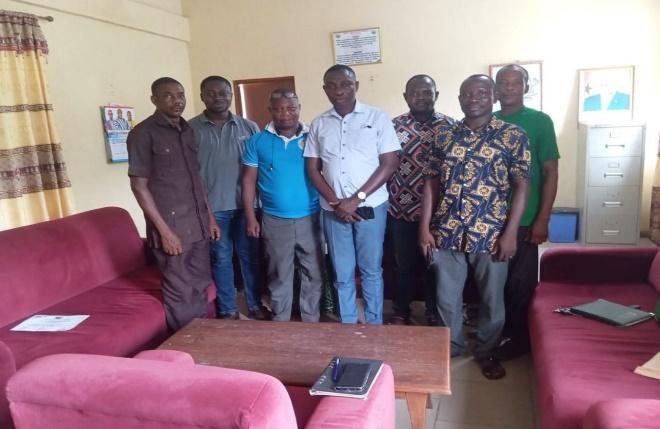
numeracy curriculum designed to prepare them for seamless integration into mainstream education.
These children will benefit from the Complementary Basic Education/Second Chance (CBE/SC) Project in its fifth year of implementation.
The children are set to begin the CBE program in October this year, participating in a nine-month intensive literacy and
Welcomingthe initiative,theMunicipalChief Executive (MCE) and the Municipal Education Director expressed their gratitude to SfLand the Luminos Fund for selectingthe municipality for this impactful intervention. They described the project as timely and pledged their full support to ensure its success. They also called on community leaders and stakeholders to actively support the initiative for the benefit of all.
Group photo with staff of Tibung R/C
SfL staff in a photo with the MCE for Atebubu-Amantin
SfL staff in a photo with the Education Director for Atebubu-Amantin
Mind shift in parents as PLCs transform parents’ involvement in their wards’ education
In Wantugu, a quiet revolution unfolded as mixed seating became the new norm, breaking down entrenched cultural barriers one session at a time. Mothers and fathers, once separated by tradition, now sat side by side, sharing ideas, laughter, and dreams for their children’s future. Parents began showering their children with praise, blending bedtime stories that sparked wonder, and nurturing bonds that had long needed rekindling.
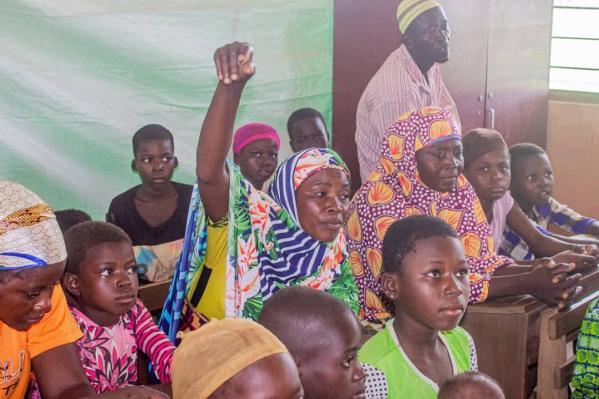
This simple yet profound shift in howparents gathered and learned together lit a spark of hope, proving that with the right space and support, communities can transform, embrace change, and pass on stronger values to the next generation.
SfL holds leadership and inclusive education workshop for educators
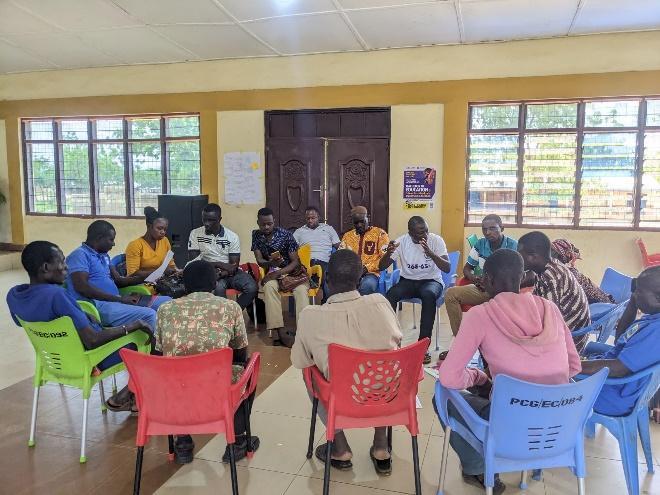
Participants in a group discussion
“Leadership is not about power; it is about purpose”. That truth echoed across the rooms of Yunyoo and Chereponi as School for Life (SfL), in partnership with Ghana Education Service (GES), brought together teachers, parents, SISOs, female educators, and district assembly officials for an unforgettable 2-day workshop on Leadership and Inclusive Education.
From laughter-filled communication games to deep reflections on empathy, emotions, and equity, the sessions weren’t just informative, they were transformational.
“For the first time, I see leadership not as a title, but as a responsibility to listen, to include, and to serve,” one teacher shared, after engaging in discussions on managing emotions and building a learning-focused school.
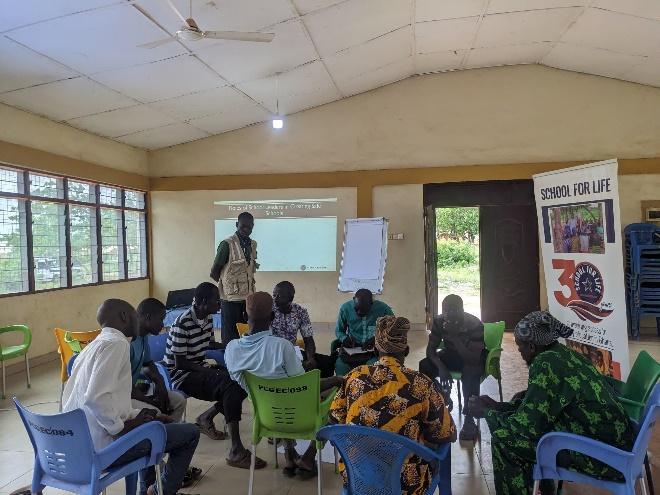
Group work session
Female educators spoke passionately about the power of challenging stereotypes and leading with empathy.
“As women in the system, we face both seen and unseen barriers. But this training reminded me that leadership is also about visibility, resilience, and supporting one another.”
Parents voiced their commitment to fostering inclusion from the home front.
“I used to think inclusion was only for schools. Now I see it begins in the home, with how we treat our own children and neighbours”, said one mother during a discussion on empathy and learner diversity.
District Assembly representatives reflected on the role of infrastructure and policy.
“Inclusive education isn’t just a buzzword; it’s a necessity for our communities. True inclusion starts with access - physical, social, and educational. Our communities must reflect that in every structure we build and every budget we plan.”
The above statement was made by Mr. Issahaku Yussif, head of the Department of Social Welfare and Community Development, Yunyoo-Nasuan District.
For SISOs, the sessions sparked renewed purpose.
“This has challenged me to go beyond inspections to become a coach, an advocate for inclusion, and a support system for teachers”, one SISO noted during the leadership reflection segment.
The training explored what it really means to lead a learning-focused school and create an environment where every child regardless of ability, gender, background, or location, is seen, heard, and empowered to thrive. From handling stereotypes to building shared visions, participants walked away with practical tools to lead change in their schools and communities.
What’s happening here is more than a workshop. It is a movement. These voices, so different yet so connected, are coming together to rewrite the story of education in Yunyoo and Chereponi. They are building a future where every child gets to learn, grow, and shine. No exceptions!
If you believe that every child deserves to learn in a safe, inclusive, and empowering environment, join the conversation. Share your thoughts. Let’s build a Ghana where no one is left behind.
STORIES OF CHANGE
Read about some of the changes our work is making in this section.
Joy in Sachilbo basic school
"It's like a miracle. Things just started changing so fast and even though it is not the beginning of a new academic year we are getting new learners come to school",
The above was a statement made by Mr. Emmanuel Jato, the Assistant Headteacher of Sachilbo Primary school in the Tatale-Sanguli District of the Northern Region.
His excitement stems from the quick turnaround of the school's fortunes after our collaborative media documentary piece Crumbling Start with Joy News. The documentary series highlighted the ‘lack of furniture’ situation in the school, forcing pupils to sit and learn on the bare floor. The school which was not part of the Ghana School Feeding Program was also struggling with enrolment and retention.
We are happy to share with you some improvements in the school after citizens advocacy actions and the media documentary.
The school has received 26 dual desks from the Districts Assembly to help mitigate the furniture deficit situation. This has provided some 52 pupils with dignified sitting and writing places to aid in learning.
The enrolment of the school has already increased from 140 pupils to 186 pupils in 3 months. This is very significant because most schools, including Sachilbo Primary School, hardly received new enrolments in the third term.This was largely attributable to the selfhelp feeding programme, which was introduced in the school.
Following the engagement of the Citizen group with the local government, the Ghana School Feeding Program has also now recently awarded the school to a caterer to start the feeding program in the school. We expect that this will further improve the school enrolment and facilitate effective teaching and learning in the school.
While expressing our gratitude to all stakeholders including the District Assembly and the School Feeding Secretariat, we are still making calls to support the school with infrastructure (classrooms) to contain the number of learners, as the current multigrade system affects effective teaching.
The CLEAR Project continues to support citizen actions to engage relevant education actors in advancing quality education delivery. This is made possible by the Global Partnership for Education through Education Out loud.
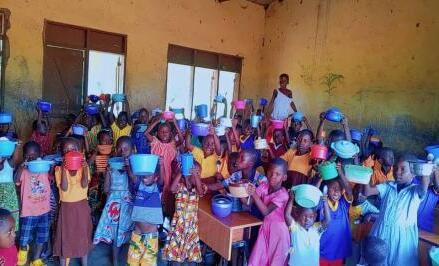

Joy on the faces of CBE learners as past beneficiaries visit

Current CBE learners were filled with both excitement and motivation as the SfL CBE Alumni Association visited 15 learning centres across Savelugu, Nanton, Kumbungu, and Tolondistrictsinthe Northern Region inMay 2025.The visit aimed to inspire learners and their parents to take education seriously. For the alumni, the visit was a moment of reflection, having once been beneficiaries of the CBE programme themselves. One emotional highlight was the testimony of Rashida Maltiti, who completed her CBE lessons in 1999 in Dijo. Growing up with her grandmother, Rashida faced resistance when she chose to attend CBE classes instead of traveling for ‘Kayayei’ work. She defied her family and pursued education an act that eventually led her to become a graduate with a stable job.
Her story and those of other alumni echoed powerfully in communities like Chehi Yapalsi, serving as a source of great motivation for both learners and parents. Ibrahim Sayibu, a parent in Cheshegu, called for more frequent visits from the alumni to encourage learners to pursue higher education beyond JHS or SHS. The visits underscored the continuing role of the CBE programme as a bridge to formal education for thousands of out-of-school children, offering hope and a pathway to a better future.

Pupils of Sachilbo Primary school served a meal
Pupils and teachers engage in a hearty game
COMMUNITY SPOTLIGHT
Siiru, Wa West, Upper West Region
Siiru, a farming community in the Wa West District of the Upper West Region is home to approximately 270 peasant farmers, living in only 27 small houses. Surrounded by two communities-SaayileyiritotheNorthwithabout 350 peopleandDaboziiriwith about 150 people to the south.
With only one boreholeprovidingwater forthe people, people of Siiru have for several years lived without many social amenities such as electricity, potable drinking water, good roads and a school. Helpless as they may be, community members in 2019 decided to take the development of their community into their own hands by tackling some of their challenges by themselves. This was because several appeals to the state did not yield any positive results.
Recognizingthateducation isveryimportant andwould build children to become responsible and productive citizens in future who can help develop the community, they decided to start a communityschoolwiththe assistanceoftheformer assemblyman ofthearea.Thiswasadecision taken by the Siiru community together with the two neighboring communities.
Starting with 36 pupils, the school was adopted by the Ghana Education Service and the District Assembly in 2020. The community members came together to put up classroom structures to accommodate the learners. The community members have also started a self-school feeding program and set up a school farm to provide foodstuffs to support the school feeding program. Currently,the studentenrolmentstandsatonehundredandseventy-one(171)pupilswitheightyone (81) boys and ninety (90) girls. The school currently operates Kindergarten 1 and 2 and Basic 1-6
The CLEAR Project works in this community building citizens capacity to take community actions in addressing community issues while advocating for enhanced quality education delivery in the community. The citizen network of the community has been at the forefront in engaging with the district assembly and district education directorate to support the school attain its vision of training quality learners.
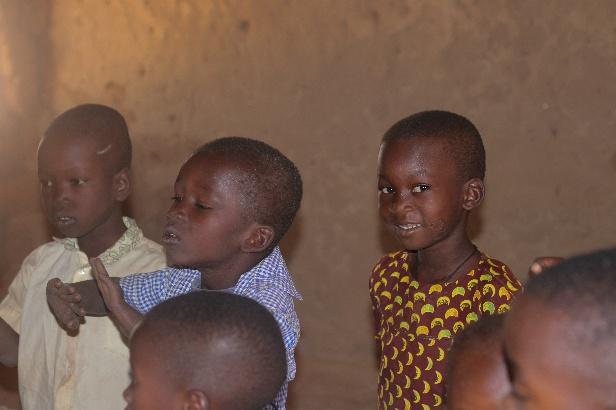
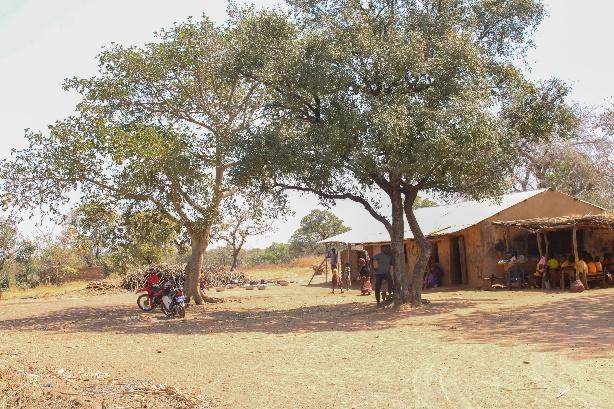
STAFF SPOTLIGHT
Going the extra mile in an outcome-based project: Rosemary Ami Amegbedzi

Rosemary is a Field Supervisor for the Ghana Education Outcome Project (GEOP) in the Biakoye District. Her primary role involves working closely with teachers, head teachers, and other stakeholders to improve learning outcomes by building teacher capacity and promoting child-centered learning practices.
What motivates Rosemary most is knowing that every action she takes contributes to delivering quality education to children in underserved communities. She has witnessed the transformative power of the project firsthand, such as with her neighbour’s daughter, who previously struggled to read but can now confidently read Consonant-vowel-consonant (CVC) sentences. Furthermore, two of the six schools under her supervision have begun winning circuit-level reading competitions, with one of them taking first place twice in a row. These tangible results fuel her passion and commitment.
One of Rosemary’s proudest accomplishments on the project was taking the bold initiative to organize early curriculum training for teachers, even before official training was conducted by management. This proactive step ensured that her schools began implementing the curriculum ahead of schedule, placing them far ahead of other schools in both the district and the region.
Some learners of Siiru primary school A view of Siiru Primary School
With her background in education and public health, Rosemary strongly believes that attaining quality education in the Biakoye District is achievable. However, it will require scaling the project to include more schools,ensuringthat allteachershave accessto the standardized teacher guides and student textbooks. Uniformity in resources would make supervision and evaluation more efficient and effective. Additionally, she emphasizes the need for ongoing teacher development, strong supervision and monitoring systems, availability of teaching and learning materials, and active involvement of both parents and the wider community.
A key challenge in her work is the low motivation and lack of commitment from some teachers. Nonetheless, through consistent engagement and support, she continues to work with them to fulfill the project’s goals.
Outside of work, Rosemary enjoys creating educational video content for children on YouTube. She also designsphonics-based worksheets and books for young learners. These hobbieshelp her stay connected to children’s learning needs and fuel her creativity in supporting teachers.
Rosemary holds a bachelor’s degree in public health and a master’s degree in Global Health. Her long-term vision is to inspire and mentor the next generation of leaders through targeted mentoring programs for junior and senior high school students. She believes that with determination and focus, young people can achieve whatever they set their minds to.
EXTERNAL EVENTS
Ghana Civil Society Forum 2025
On the 25th and 26th of June, our Director, Hajia Wedad together with Ms. Gloria participated in the Ghana Civil Society Forum held in Accra at the Ghana National Association of Teachers Headquarters.
Organised by STAR-Ghana Foundation and partners, this year’s forum explored the theme “reimagining development financing and civic action – challenges, opportunities and the way forward”, bringing together about 500 individuals from various civil society organisations across the country.
Through the practical breakout sessions, participants were able to explore as practically as possible how CSOs can rebuild trust in their line of work as well as initiating work transparency mechanisms.
We are honoured to have participated in this and are glad to note that our current strategic plan which will be in use to 2030 comprehensively captured School for Life’s plan on local fundraising activities and promoting local ownership.
Over three decades since the inception of our flagship Complementary Basic Education (CBE) programme, our past beneficiaries are making strides in various sectors. From entrepreneurs to civil servants, they carry the banner of School for Life wherever they go.
In this edition of our newsletter, we are sharing the inspiring story of Alhassan Tahidu Adam. We hope you will enjoy it.
From Gbumgbum to Greater Heights: The Inspiring Journey of Alhassan Tahidu Adam

Growingup inthe rural communityof Gbumgbum in the Savelugu Municipality, Tahidu Adam never imagined education would become the key to unlocking hispurpose in life. Like many children in underserved areas, he lacked access to quality basic education until he enrolled into School for Life's Functional Literacy Programme; the Complementary Basic Education (CBE).
"In just nine months of evening classes, it changed both my life and the lives of my peers," Mr. Tahidu recounts.
Through the CBE programme, he learned to read and write in his mother tongue, Dagbanli, which gave him the confidence and foundational skills needed to transition seamlessly into formal education. He was placed directly into Basic 3 after completing the SfL CBE programme.
Today, Adam is a graduate of the University for Development Studies, a testament to how a short intervention can create lasting transformation.
ALUMNI SPOTLIGHT
Professionally Tahidu has done voluntary service with various local organisations, and is currently theRighttoInformation (RTI)Officer atthe TamaleMetropolitanAssembly(TaMA).He alsoserves as the interim General Secretary of the School for Life Alumni Association, giving back to the very initiative that once empowered him.
Adam's story is one of resilience, growth, and the ripple effect of community-based education. It is proof that language-friendly, non-formal education when well-executed can be the bridge from marginalisation to meaningful participation in national development.
AtSchoolforLife,weremaincommittedtoreachingthelastmileandgivingeverychild,likeAdam, a chance to dream, learn, and lead.
For enquiries reach out to School for Life via any of the channels below:
Street address: Naa Luro estate, off the Nobisco main road, Tamale.
Postal address: P. O. Box TL 787, Tamale, N/R.
��Telephone: +233 3720 22023
�� Website: www.schoolforlifegh.org
��Email: info@schoolforlifegh.org
